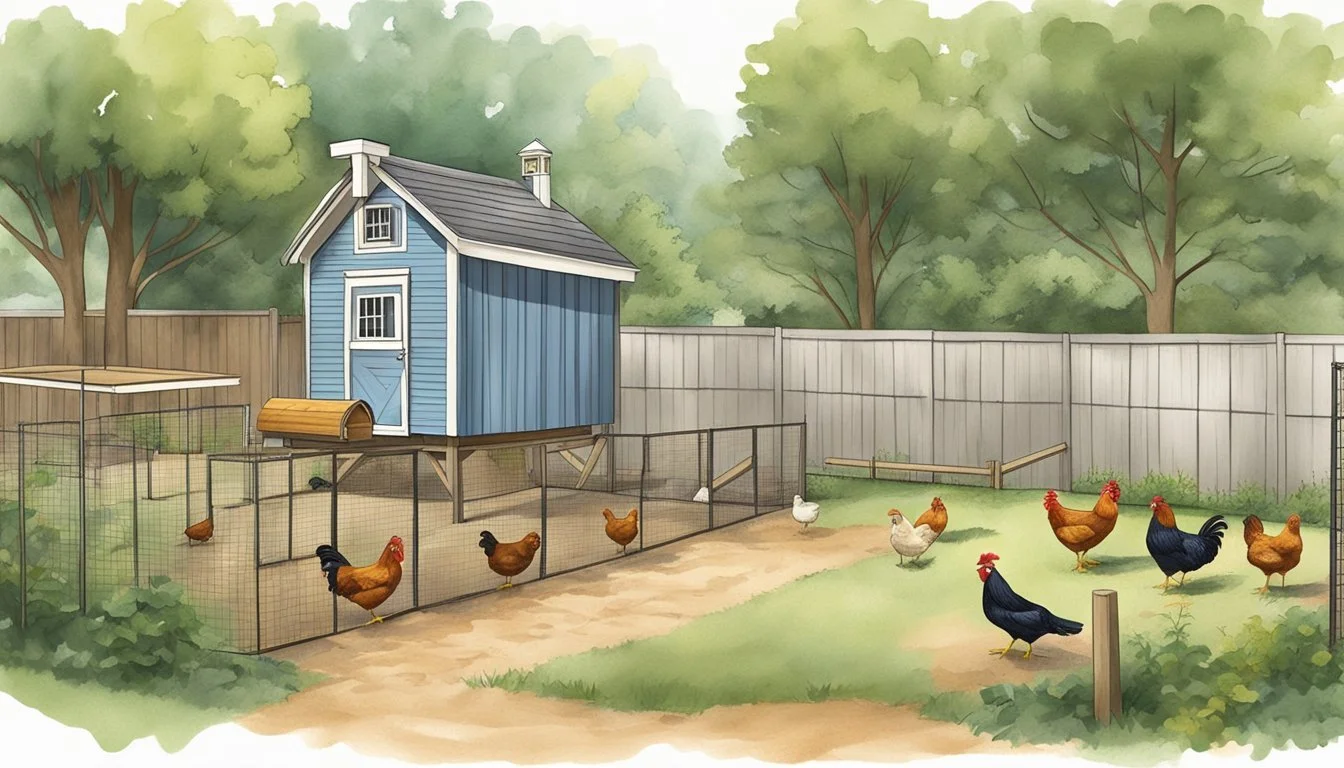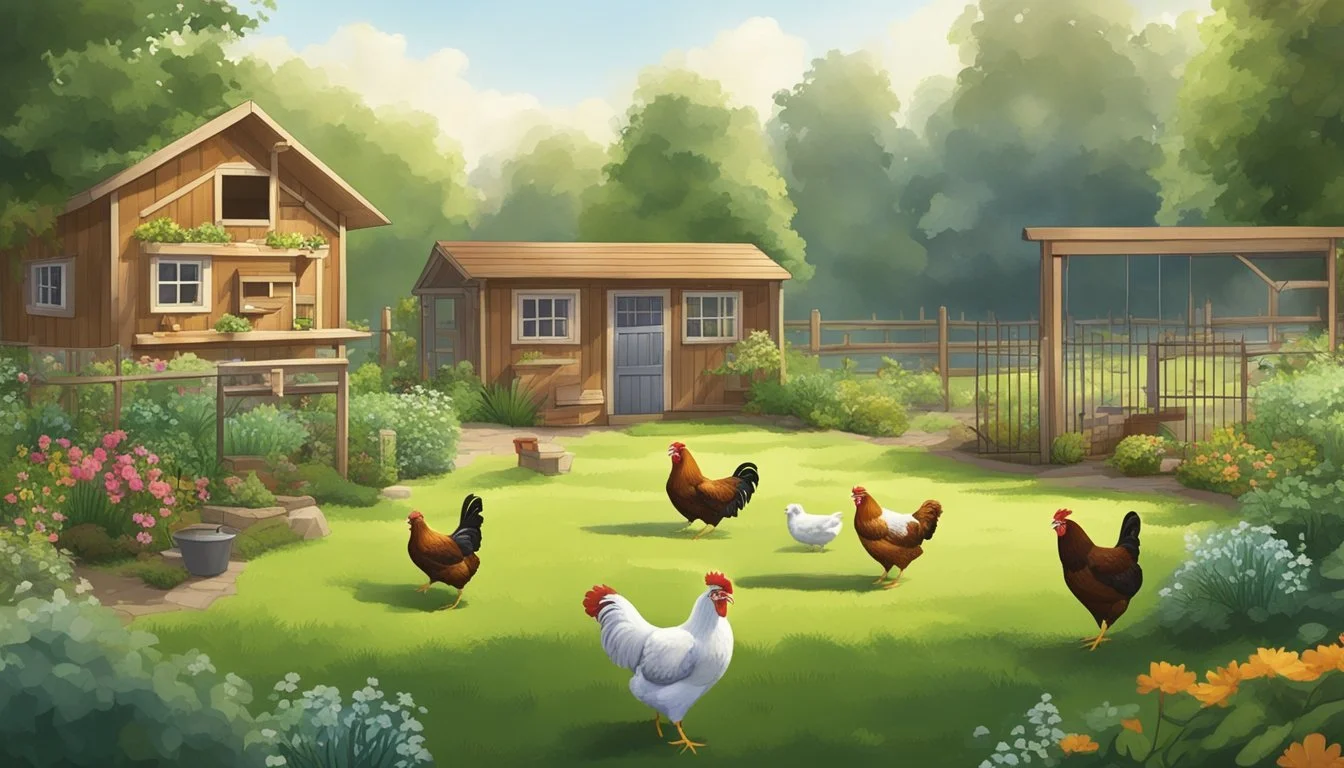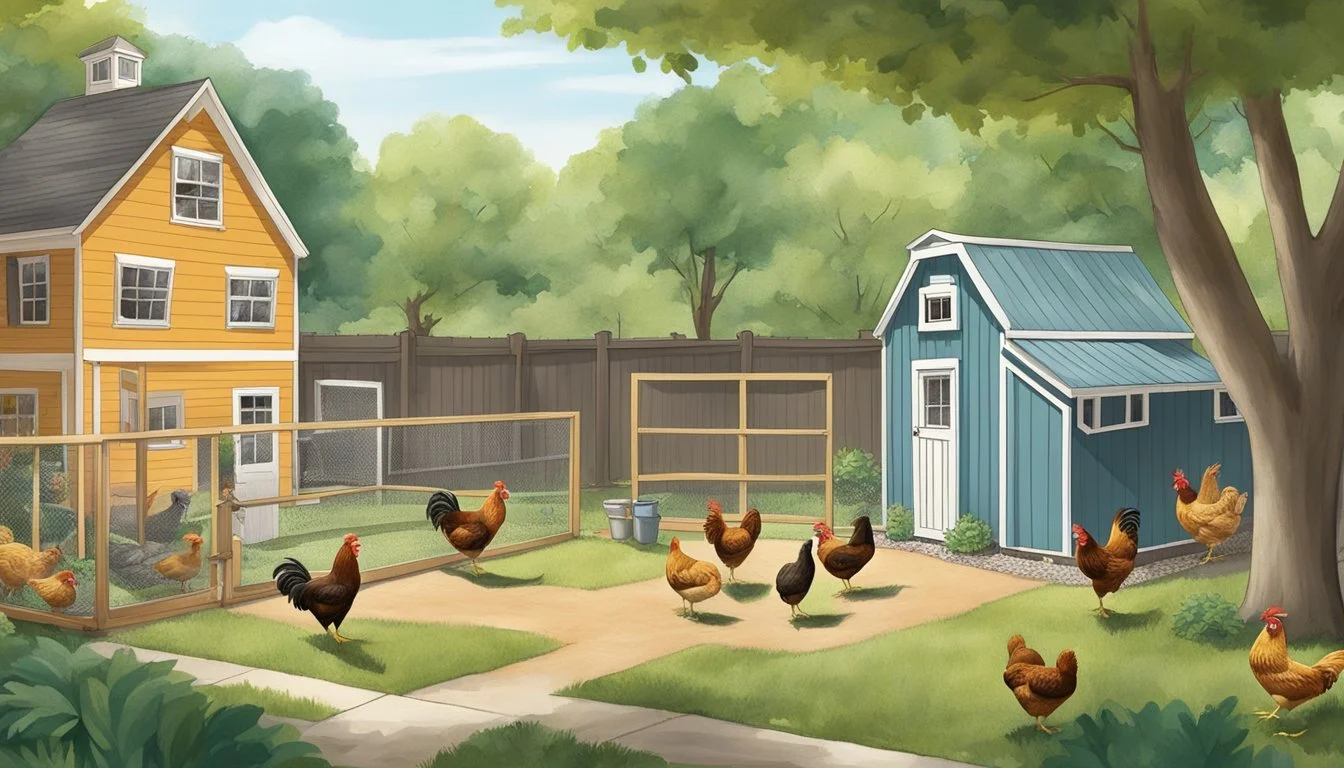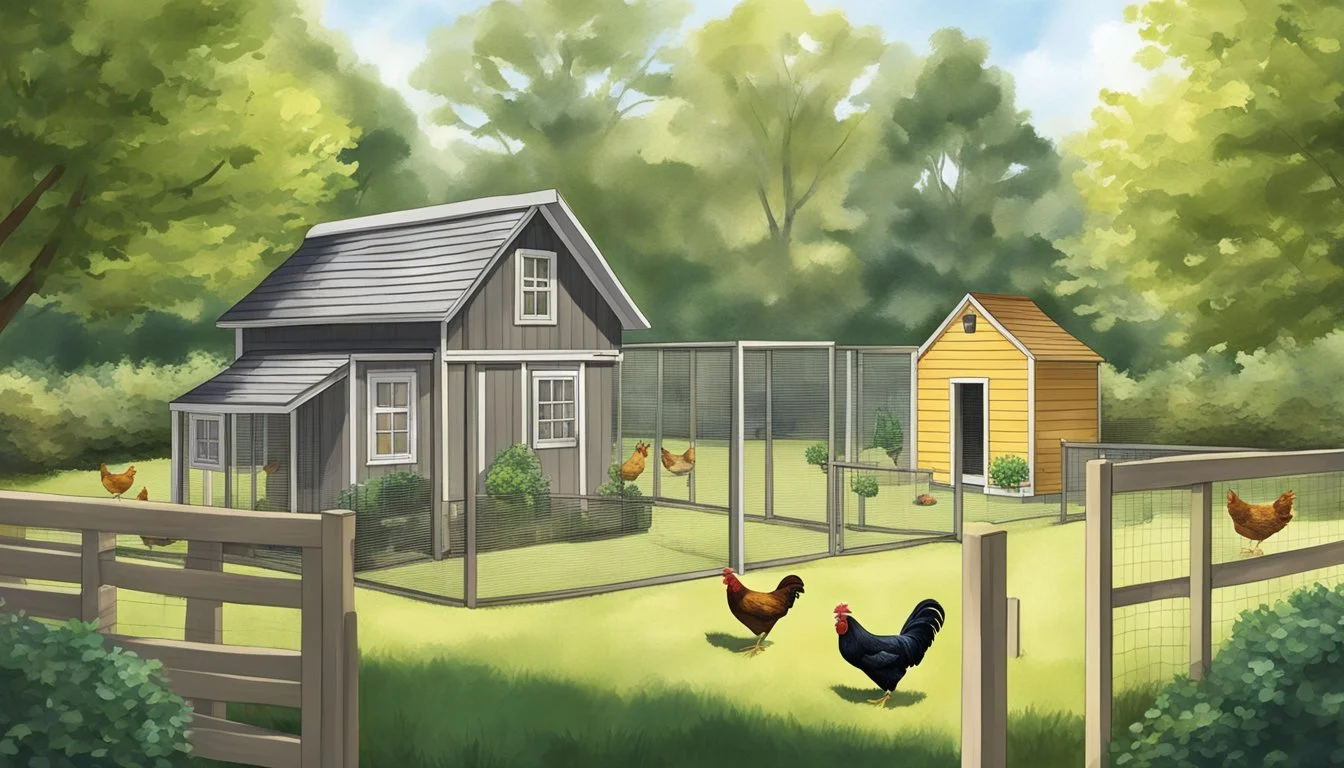Keeping Backyard Chickens in Cary, NC
Essential Guidelines for Urban Poultry Farmers
Keeping backyard chickens (how long does chicken last?) is becoming an increasingly popular practice among residents in Cary, North Carolina. The appeal of fresh eggs and the desire to engage in sustainable living practices are driving more people to explore the idea of raising hens in their own yards. Before embarking on this endeavor, it is essential for Cary citizens to be aware of the specific regulations and requirements set forth by the town to ensure a harmonious and legal backyard chicken experience.
The Town of Cary mandates that all backyard chickens must comply with the standards stated in the Land Development Ordinance Section 5.3.4(J). This includes a stipulation that the minimum lot size for keeping chickens is 6,000 square feet. Furthermore, chickens are only allowed on properties classified as single-family detached dwelling units. Prospective chicken keepers must also provide a suitable coop and pen or utilize movable chicken tractors. These housing requirements not only serve the well-being of the chickens but also address any potential concerns from neighbors regarding cleanliness and noise.
For those interested in the nuances of keeping garden chickens, understanding the day-to-day demands is necessary. Properly raising backyard chickens involves daily maintenance, including providing adequate space, ensuring access to food and water, and maintaining a clean living environment. Each chicken requires sufficient room to roam and nest, which translates to specific space allocations per bird within the coop and pen. Addressing these practical aspects of chicken care fortifies the success and enjoyment of keeping backyard chickens in Cary.
Understanding Local Ordinances
When considering keeping backyard chickens in Cary, NC, it is imperative to navigate the local ordinances that govern this practice. These laws cover everything from permit requirements to zoning and are crucial to ensure compliance and avoid potential legal issues.
Cary City and Wake County Regulations
In Cary, a city situated within Wake County, backyard chickens are subject to city-specific ordinances as well as county rules. These regulations are designed to maintain public health and safety, as well as neighborhood harmony. Chickens must be kept in sanitary conditions at all times with their coops and surrounding areas cleaned regularly to prevent odors and the attraction of pests.
Specific Zoning Laws for Cary
Zoning laws differ by location within Cary, and residents must check with local government to determine if backyard chickens are permissible where they live. Typically, these laws will stipulate how many chickens are allowed and where coops can be placed in relation to property lines.
Permit Requirements for Keeping Chickens
In Cary, chickens are allowed, but a permit may be required before setting up a coop. This permit ensures that all necessary guidelines are met. The cost of a permit can be around $50, and it verifies adherence to city ordinances. Moreover, secured containers are mandated for chicken feed to deter rodents.
Homeowners Association and Community Agreements
Residents of Cary should also review any Homeowners Association (HOA) covenants or community agreements. Although the town may allow chickens, individual neighborhoods could have stricter rules or even prohibit chickens entirely. It's essential to confirm that keeping chickens does not violate any HOA policies.
Setting Up Your Backyard Chicken Environment
In Cary, North Carolina, residents looking to keep backyard chickens must ensure an appropriate environment for their flock. Proper housing is essential for the health, safety, and welfare of backyard chickens.
Choosing the Right Coop
Every backyard chicken owner should begin with a suitable coop. The coop must be sizeable enough to accommodate the anticipated flock, providing at least 3-4 square feet per chicken inside the coop. Ventilation is important to maintain air quality, but drafts should be minimized. The coop must be built of sturdy materials to ensure durability and provide ample shelter from the elements. When selecting or building a coop, ensure it has:
Sufficient space for the number of chickens
Proper ventilation to prevent condensation and odors
Insulation to protect against Cary's weather variations
Designing a Safe and Comfortable Pen
Adjacent to the coop, a protective pen or run gives chickens the freedom to move more openly in a safe, secure environment. The pen should offer a minimum of 8-10 square feet per chicken, allowing them to roam, forage, and exhibit natural behaviors. Incorporating elements such as roosting bars, dust bathing areas, and shade will significantly enhance their comfort. For the pen, key considerations include:
Adequate space for free movement
Security features like buried hardware cloth to deter burrowing predators
Various enrichment features for the chickens' well-being
Protecting Your Flock from Predators
Predator-proofing is a non-negotiable aspect of keeping backyard chickens. In Cary, common predators may include raccoons, hawks, and neighborhood dogs. To protect the flock, chicken owners should thoroughly reinforce the coop and pen with sturdy materials such as hardware cloth instead of chicken wire. Enclosures must be secured from all sides, including overhead and below-ground threats. Simple ways to protect the flock involve:
Utilizing hardware cloth instead of chicken wire for better strength and smaller openings
Securing the perimeter, including burying barriers to prevent predators from digging under the pen
Locking coop doors securely at night to safeguard chickens during their most vulnerable hours
Chicken Care Essentials
Proper chicken care in Cary, NC hinges on consistent access to fresh water and food, vigilance against health issues, and adherence to daily and seasonal routines for optimal welfare.
Feeding and Watering Your Chickens
Chickens require a consistent supply of fresh food and clean water daily. Owners should ensure:
Feed: Provide a balanced diet of commercial poultry feed, tailored to the chicken's life stage (i.e., chick starter, layer pellets).
Water: Maintain fresh water availability at all times. Waterers must be cleaned regularly to prevent algae and bacterial growth.
Understanding Chicken Health and Disease
Monitor for signs of distress or illness, which may include changes in behavior, eating habits, or egg production.
Preventative measures like vaccinations, parasite control, and maintaining a clean habitat reduce disease risk.
Daily and Seasonal Care Routines
Daily: Collect eggs, refresh food and water, and clean the coop to prevent waste buildup and odors.
Seasonal: Prepare the coop for temperature changes, ensuring ventilation in summer and insulation in winter.
Community Relations and Chicken Keeping
In Cary, NC, maintaining positive community relations is crucial when keeping backyard chickens. Responsible chicken keeping hinges on effective communication, managing potential disturbances, and adhering to town regulations.
Communicating with Neighbors
Proactive and transparent communication with neighbors can prevent misunderstandings or complaints regarding one's backyard chickens. It is advisable to inform neighbors of the intention to keep chickens and discuss any concerns they may have. Providing neighbors with knowledge about the care and management of chickens may alleviate worries about noise, odor, and pests.
Managing Noise and Odor
Backyard chicken keepers must manage noise and odor to minimize any potential impact on surrounding properties. This includes:
Noise: Ensuring roosters are not kept, as they are typically prohibited due to noise concerns.
Odor: Regular cleaning of the coop and proper disposal of waste.
Waste Management: Implementing a consistent routine to collect and compost chicken waste helps to keep the yard free of garbage and odors.
Legal Considerations and Compromises
Compliance with local ordinances is paramount in backyard chicken keeping. In Cary, residents are required to:
Lot Size: Ensure their lot size meets the minimum requirement of 6,000 square feet for chicken keeping.
Permits: Obtain any necessary permits as mandated by the town council.
Housing Restrictions: Keep chickens in single-family detached dwelling units only.
Occasionally, compromises may need to be made based on feedback from the town council or neighbors to find a balance that promotes community harmony and respects local laws.
Types and Breeds of Chickens
When considering adding chickens to a backyard in Cary, NC, it is important to choose breeds that align with your objectives, whether for egg production, as pets, or simply for their ornamental value. Certain breeds are better suited for specific roles, and understanding these characteristics is key to a successful and enjoyable experience.
Selecting the Best Breeds for Your Needs
When determining which chicken breeds to raise, one should consider factors such as climate adaptability, space requirements, and temperament. For small backyards, Bantam varieties, which are miniature chickens, can be a practical choice. They require less space and are generally easier to manage. Those seeking friendly pets may opt for breeds like Silkies or Orpingtons, known for their docile nature. For heritage breeds, which are breeds that have been established for a long time and are often more adaptable to local environments, options such as Plymouth Rocks or Rhode Island Reds are popular and hardy choices.
Egg Production and Breed Characteristics
Chickens are primarily categorized by their egg-laying capabilities. Those interested in high egg production will find breeds like Leghorns and Australorps appealing, as they can lay upwards of 250 eggs per year. Mature hens usually have more consistent laying patterns than young hens. Egg color also varies by breed; for example, Ameraucanas lay blue eggs, while Marans are known for their dark brown eggs. It is also important to note that fertilized eggs require a rooster, although hens will lay unfertilized eggs without one.
Raising Roosters in Residential Areas
In Cary, as in many urban and suburban areas, local ordinances may restrict or prohibit the keeping of roosters due to noise concerns. Roosters are not necessary for hens to lay eggs unless one desires fertilized eggs for breeding purposes. Prospective chicken owners should directly consult Cary's specific bylaws to ensure compliance. It is generally advisable to focus on keeping hens in residential settings to avoid potential issues and to maintain good relationships with neighbors.
Productive Backyard Chicken Practices
Keeping chickens can be a fruitful endeavor when managed correctly. They offer more than just fresh eggs; they can contribute to garden health and provide natural fertilizer.
Incorporating Chickens into Your Garden
Chickens can be excellent garden helpers. By allowing them to forage in the garden, they consume pests and weeds, which reduces the need for chemical treatments. The main garden benefit is their natural foraging behavior. To ensure chickens contribute positively without harming plants, they should have limited, supervised time in the garden, or specific areas should be designated for their foraging.
Using Chicken Waste as Fertilizer
Chicken waste is rich in nitrogen, making it an excellent compost material to improve soil fertility. However, raw chicken manure is too strong to be used directly and can burn plants. It's important to compost the waste before applying it to the garden.
Process Description Collection Gather chicken waste regularly from the coop and pen. Composting Combine with carbon-rich materials like dry leaves or straw. Curing Allow the compost to cure, turning it occasionally for aeration. Application Use the finished compost to enrich garden soil.
Harvesting and Using Fresh Eggs
Fresh eggs from backyard chickens often surpass store-bought ones in flavor and nutrition. Consistent collection is key to maintaining cleanliness and preventing egg-eating behaviors. Ensure the chickens have:
A well-constructed coop
Clean nesting boxes
Chickens typically lay eggs in the morning, so checking nesting boxes in the early part of the day ensures the freshest eggs and reduces the chances of them getting dirty or damaged.
Educational Resources and Community Support
Residents of Cary, North Carolina, seeking advice on raising backyard chickens can find valuable support through local classes and online resources. Both state and county extensions offer guidance, ensuring that community members are well-informed and comply with local chicken laws.
Local Classes and Workshops
North Carolina State University provides accessible educational initiatives for interested individuals. Workshops focus on practical aspects such as coop construction, care, and maintenance. Wake County and neighboring counties like Durham and Raleigh schedule regular educational events, which are often announced by the town council or hosted in collaboration with local gardening clubs.
Upcoming Events:
Chicken Keeping 101
Advanced Coop Design
Flock Health Management
Local residents can also attend giving classes that focus on how to utilize chicken litter as organic fertilizer, simultaneously reducing waste and benefiting their gardens.
Online Publications and Resources
Digital publications offer a wealth of information, from detailed care instructions to troubleshooting common poultry issues. The NC State Extension Publications feature online manuals and fact sheets tailored to North Carolina's climate and regulations.
Key Resources:
Essential Care for Garden Chickens
Managing Poultry Waste
Understanding Local Chicken Laws in Wake County
These resources provide reliable content for both novice and experienced chicken enthusiasts. Additionally, the Town of Cary website hosts guidelines and permit applications to assist residents in adhering to local chicken laws.
Design and Planning for Chicken Coops
When planning a chicken coop in Cary, NC, residents must adhere to specific space, ventilation, and lighting requirements to ensure the health and safety of the chickens.
Coop Size and Space Requirements
The coop must provide adequate space for the chickens to live comfortably. Each chicken requires a minimum of 4 square feet of space inside the coop and 10 square feet in the outdoor pen. It is essential to position the coop and pen in the rear yard, maintaining a minimum setback of 15 feet from property lines and ensuring it is closer to the owner's home than to any neighboring homes. Coop designs should accommodate this spacing rule to avoid conflicts with local regulations.
Ventilation, Lighting, and Weather Considerations
Proper ventilation is crucial to prevent moisture buildup and to keep the air fresh inside the coop, which is important for the health of the chickens. Incorporating windows or vents can provide necessary airflow and can be adjusted based on weather conditions. For lighting, a simple lamp can be used to extend daylight hours, especially during the shorter days of the year, which helps maintain egg production. Given that Cary, NC experiences mild winters, coops can be designed with weather-appropriate materials and insulation to protect the flock from the elements while ensuring adequate ventilation. It's important to balance these needs to prevent drafts in colder temperatures or overheating in the summer months.
Maintaining a Healthy Flock
In Cary, North Carolina, success in backyard chicken keeping hinges on the health and vigor of the flock. Owners must prioritize disease prevention, optimal nutrition, and coop cleanliness to ensure the well-being of their birds.
Preventing and Detecting Poultry Diseases
Keeping a flock free of diseases requires vigilance and proactive measures. It's imperative to observe one's birds regularly for signs of illness, such as lethargy or changes in eating habits. One should immediately quarantine any chicken showing symptoms of disease to prevent its spread.
Routine Health Checks: Regular handling and inspection of each bird can detect early signs of illness.
Vaccinations: Consult with a local veterinarian to establish a suitable vaccination schedule.
Pest Control: Implementing strategies to keep rodents away from the coop is crucial as they often carry diseases.
Feed Storage: Chicken feed should be stored in secure containers to avoid attracting pests and maintaining the quality of the feed.
Optimizing the Coop Environment for Health
A well-maintained coop supports the health of a backyard flock by providing adequate space, ventilation, and cleanliness.
Ventilation: Proper airflow helps to remove dampness and ammonia, creating a healthier environment.
Dry Litter: The coop should have dry litter which absorbs moisture and reduces the spread of pathogens.
Regular Cleaning: Hen droppings and uneaten feed should be removed regularly to prevent odors and disease.
A diet including oatmeal can support the health of chickens, given its nutritional benefits when offered as part of a balanced feed.
In conclusion, maintaining a healthy flock in Cary, NC, requires attention to potential diseases, effective management of living conditions, and proper feed storage practices. Adhering to these principles is essential for keeping one's chickens vibrant and productive.
Practical Tips for New Chicken Owners
Before new chicken owners in Cary, NC start their backyard flock, it's crucial they gather insights from veterans in the practice and establish effective care routines.
Learning from Experienced Backyard Farmers
Seasoned chicken keepers stress the importance of state regulations where they state that the coop and run area should be consistently clean to prevent odor and pests. Following their advice, owners should construct their chicken habitats with maintenance in mind, ensuring easy access for regular cleaning. Owners can also tap into local resources such as farm supply stores or online forums for tailored advice on keeping chickens in Cary's climate.
Creating Efficient Care Schedules
Proper care for chickens involves daily feeding, egg collection, and coop cleaning. By establishing clear schedules, owners can maintain a high standard of care without becoming overwhelmed. Here are two tables to help new owners manage their tasks:
Daily Care Schedule
Time Task Notes Morning Release and Feed Open coop; provide fresh food Afternoon Egg Collection Collect eggs; check water Evening Secure for the Night Lock coop; replenish feed
Weekly Cleaning Schedule
Day Task Notes Monday Scrub Waterers Prevent algae and buildup Wednesday Rake/Change Bedding Maintain coop hygiene Friday Inspect for Pests Look for signs of mites/lice
Additionally, they should not overlook the benefits of services such as coop cleaning or chicken health checks offered by local poultry enthusiasts or veterinary clinics. Proper care extends to ensuring chickens have enough space in their run to exhibit natural behaviors which in turn fosters a healthy and productive flock.











